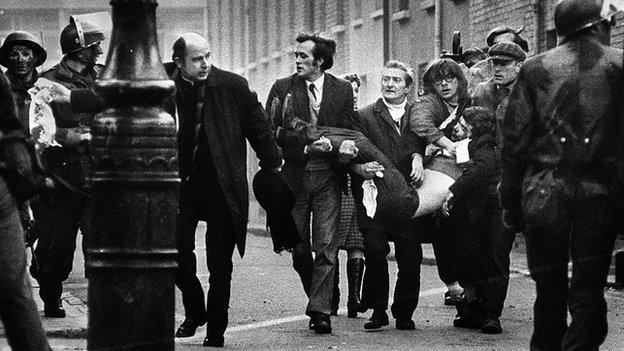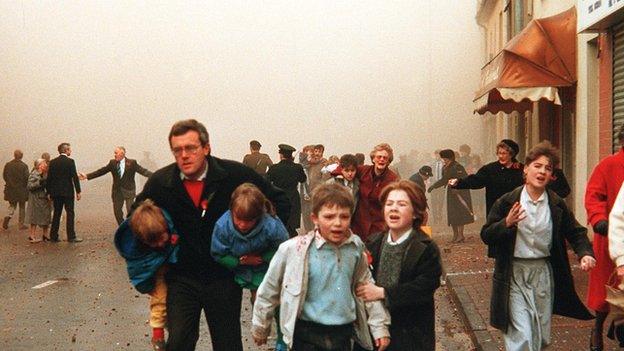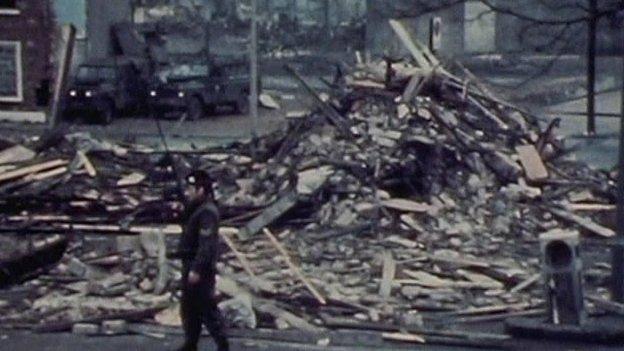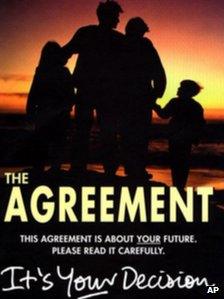NI attorney general John Larkin calls for end to Troubles prosecutions
- Published

One of the victims of the 1972 Bloody Sunday shootings in Londonderry is carried away. Thirteen people were shot dead by British soldiers, while a 14th died months later

Eleven people were killed and 63 injured when an IRA bomb exploded at the cenotaph in Enniskillen on Remembrance Day in 1987

The remains of McGurk's bar in north Belfast. Fifteen people were killed in the loyalist bomb attack in 1971
There should be an end to prosecutions for Troubles-related killings, Northern Ireland's attorney general has said.
John Larkin said there should be no further police investigations, inquests or inquiries into any relevant killings that took place before the signing of the Good Friday Agreement in 1998.
That means all deaths caused by paramilitaries, police or the Army.
Mr Larkin said his proposal was not a formal amnesty, but was a logical consequence of the Agreement.
The Democratic Unionist Party (DUP), the largest political party in Northern Ireland, said the attorney general had not consulted the Stormont Executive about his proposals before making them public.
More than 3,500 people were killed during three decades of conflict in Northern Ireland.
Mr Larkin's comments come as former US diplomat Richard Haass tries to broker a political agreement over how to deal with the legacy of Northern Ireland's past, as well as controversial parades and the flying of flags.
The UK government has rejected suggestions of an amnesty.
'Few prosecutions'
A spokesman for Prime Minister David Cameron said: "The prime minister's view is that the decisions around prosecutions are for the police and prosecuting authorities, based on the evidence that they have.
"His view is a long-standing one, that where relevant independent authorities have evidence, they should be able to take that forward in the way that they best judge.
"That remains his view. There is no change in that."
A number of victims' relatives and groups representing victims of the Troubles have also condemned Mr Larkin's suggestion.
Mr Larkin told the BBC: "More than 15 years have passed since the Belfast Agreement, there have been very few prosecutions, and every competent criminal lawyer will tell you the prospects of conviction diminish, perhaps exponentially, with each passing year, so we are in a position now where I think we have to take stock.
"It strikes me that the time has come to think about putting a line, set at Good Friday 1998, with respect to prosecutions, inquests and other inquiries."
Commenting on the remarks, PSNI Chief Constable Matt Baggott said: "We welcome the debate into how we deal with the past and will study carefully what the attorney general has said.
"It is well documented that the cost of policing the past has a massive impact on how we deal with the present and the future.
"Whilst we are committed to meeting our current legislative responsibilities, dealing with legacy issues continues to place significant pressure on our organisation and financial resources."
'Utter betrayal'
The DUP's Jeffery Donaldson said: "There is no nation in the free world today where murder is not a crime, you cannot say that murder is not a crime - it is.
"There are 3,000 unsolved murders in Northern Ireland and those families are entitled to the right to pursue justice."
Call to end Troubles prosecutions
The nationalist Social Democratic and Labour Party (SDLP) said the attorney general's remarks were a "cause of real concern".
SDLP justice spokesperson Alban Maginness said victims and survivors of state and paramilitary violence were "entitled to justice irrespective of the lapse of time".
Patrick Corrigan from Amnesty International called Mr Larkin's proposals "an utter betrayal of victims' fundamental right to access justice".
However, former Northern Ireland secretary of state, Peter Hain, described Mr Larkin's proposals as "common sense".
Writing on his Twitter account, Mr Hain agreed there should be "no pre-Good Friday conflict-related prosecutions".
"Best to help victims and address the past in other ways," he wrote.
'Crimes still crimes'
If adopted, in addition to the end to all criminal prosecutions and coroners' inquests, Mr Larkin's proposals would result in the abolition of the Historical Enquiries Team (HET), the body set up to review killings during the period known as the Troubles.
The attorney general, who is the chief legal adviser to the Stormont Executive for civil and criminal matters, said the proposal was a logical consequence of the terms of the Good Friday Agreement.
He said the agreement included the 1997 arms decommissioning statute, which meant any weapons handed over to be put beyond use could not be tested forensically to obtain evidence in criminal prosecutions.
Legislation introduced in 1999 covering the recovery of the Disappeared, external - people murdered and secretly buried by republican paramilitaries - states that information that leads to remains being found can be examined only to establish identity, not forensically.
That means they cannot be used as evidence for a criminal trial.
Another part of the agreement, the Sentences Act, provided for vastly reduced jail terms for anyone convicted of a Troubles-related killing - anyone convicted would spend a maximum of two years in prison.
Mr Larkin said his proposal did not constitute an amnesty, although many will interpret it as one.
"Sometimes the fact of an amnesty can be that that which was a crime ceases to be a crime. That wouldn't be the position here, it would simply be that no criminal proceedings would be possible with respect to those offences," he said.

Mr Larkin said his proposal was a logical consequence of the Good Friday Agreement
"So there is an evenness. At present we have very good tools, subject to the point I've made about the passage of time, for critiquing the state, but we don't have them for bringing to account those who have committed offences against the state."
Stimulate debate
In the absence of legal proceedings, Mr Larkin believes relatives of Troubles victims should be given as much access as possible to records to help them find out what happened to their loved ones.
Mr Larkin, who has made a submission to the talks process chaired by Dr Haass, said he believed he had a duty to stimulate debate on how society deals with the legacy of the past.
"Of course, the question of whether the law changes is not for me, that's for the politicians," he said.
Meanwhile, Mr Larkin has ordered a new inquest into the killings of two people when loyalists, including rogue members of the Royal Ulster Constabulary and Ulster Defence Regiment, attacked a bar in the village of Keady, south Armagh in 1976, according to the Belfast-based solicitor Kevin Winters, who is representing the families.
The attack was allegedly carried out by a group known at the Glenanne Gang.
The fresh coroner's court probe followed a report by the HET, which according to Mr Winters, pointed to one of the most notorious examples of collusion involving the security forces.
- Published20 November 2013
- Published20 November 2013
- Published20 November 2013
- Published18 November 2013
- Published4 November 2013
- Published11 November 2013
- Published12 September 2013
- Published12 September 2013
- Published5 September 2013